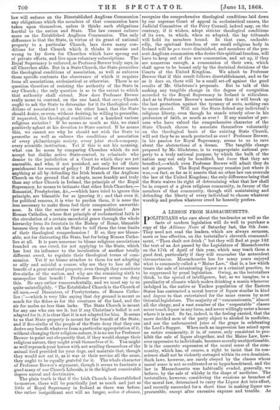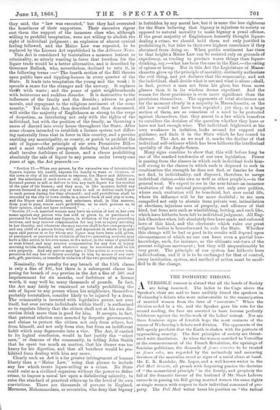A LESSON FROM MASSACHUSETTS.
POLITICIANS who care about the tendencies as well as the facts of modern legislation will do well to purchase a copy of the Alliance Hews of Saturday last, the 6th June. They need not read the leaders, which are always sermons, more or less effective, on the teetotaller's eleventh command- ment, "Thou shalt not drink ;" but they will find at page 182 the text of an Act passed by the Legislature of Massachusetts on the 17th of April of this year, which may teach them a good deal, particularly if they will remember the antecedent circumstances. Massachusetts has for many years enjoyed what is commonly called a "Maine Law," that is, a law which treats the sale of intoxicating liquor as a criminal practice, to be suppressed by penal legislation. Owing, as the teetotallers think, to the spread of intelligence, but, as we imagine, to a peculiarity of climate which makes drinking a mania whenever indulged in, the native or Yankee population of the Eastern States has contracted a moral horror of liquor similar in kind and degree to that entertained for the same reason by most Oriental legislators. The majority of "communicants," almost all the clergy, and a vast number of the " respectable " classes never touch liquor in any form, and never willingly enter a house where it is used. So far, indeed, is the feeling carried, that the more decided men of the party object to alcohol in medicine, and use the unfermented juice of the grape in celebrating the Lord's Supper. When such an impression has seized upon an entire community, it is, of course, only consistent to pro- hibit the sale of liquor altogether, and the Maine Law, how- ever oppressive to individuals, becomes morally unobjectionable. It is the concrete expression of the moral sense of the com- munity, which has, of course, a right to insist that its con- science shall not be violently outraged within its own dominion. Such laws, however, are rarely obeyed by the classes whose moral sense is not so cultivated or so hypochondriacal, and the law in Massachusetts was habitually evaded, generally, we believe, by the sale of whisky in the shape of medicine. The teetotallers, however, considering the evasions as breaches of the moral law, determined to carry the Liquor Act into effect, and recently succeeded for a short time in making liquor un- procurable, except after excessive expense and trouble. As they said, the "law was executed," but they had overrated the heartiness of their supporters. Their excessive rigour cost them the support of the immense class who, although willing to prohibit temptation, were not willing to abolish the right of individual judgment ; an explosion of almost cynical feeling followed, and the Maine Law was repealed, to be replaced by the Licence Act republished in the Alliance NEWS.
This Act is considered by teetotallers a measure lenient to criminality, so utterly wanting in force that freedom for the liquor trade would be a better alternative, and is described by Governor Bullock, who, nevertheless, declined to veto it, in the following terms :—" The fourth section of the Bill throws open public bars and tippling-homes in every quarter of the State. It leads into temptation the young and the weak ; it spreads a snare for the stranger and the unwary. It replaces thrift with waste ; and the peace of quiet neighbourhoods with boisterous and reckless disorder. It is destructive to the influences of the family and the fireside ; adverse to good morals, and repugnant to the religious sentiment of the com- munity." Yet this Act, thus described and thus denounced, will strike the majority of Englishmen as strong to the verge of despotism, as interfering not only with the rights of the individual, but with the position of the family, as throwing a cause of discord into every house throughout the State. After some clauses intended to establish a licence system not differ- ing materially from that in force in this country, and a proviso enabling any municipality, or county, or parish to prohibit the sale of liquor—the principle of our own Permissive Bill— and a most valuable paragraph declaring that adulteration shall involve forfeiture of licence, and a clause prohibiting absolutely the sale of liquor to any person under twenty-one years of age, the Act proceeds :—
" Section 15.—When any person, by the excessive use of intoxicating liquors, injures his health, exposes his family to want or violence, or the town or city of his settlement to expense, the Mayor and Aldermen, and the selectmen of such town or city, shall, in writing, forbid any licensed person to sell or deliver to him any such liquor for the residue of the year of his licence ; and they may, in like manner, forbid any person licensed in any other city or town to sell or deliver such liquor to such person during the time aforesaid; and said prohibition shall be recorded by the city or town clerks in a record book of said city or town, and the Mayor and Aldermen, and selectmen shall, in like manner, from year to year, renew such prohibition, as to such persons as, in their opinion, shall not have reformed." "Section 17.—A married woman may have an action of tort in her own name against any person who has sold or given to, or purchased or procured for her husband any liquors, in violation of the two preceding sections, and may recover compensation for any loss or injury accruing to her thereby, and whatever she may recover shall be her own property ; and any child of a person living with, and dependent in whole or in part upon said person to or for whom any liquor may have been Bold, given, or purchased, or procured in violation of the two preceding sections, may have a like action in his own name, or if a minor, in the name of guardian or next friend, and may recover compensation for any loss or injury accruing to him thereby, and whatever may be recovered shall be his own property. And any person may have a like action to recover com- pensation for any loss or injury accruing to him by means of any such sale, gift, purchase, or transfer in violation of the two preceding sections.'
Nominally, the penalty for any breach of the 15th clause is only a fine of 10/., but there is a subsequent clause im-
posing for breach of any proviso in the Act a fine of 50/. and imprisonment for six months, and forfeiture of a licence worth, it may well be, many thousands of pounds. In fact, the Act may fairly be construed as totally prohibiting the sale of liquor to any person whom his neighbours, themselves probably teetotallers, consider likely to be injured by a dram. The community is invested with legislative power, not over itself, but over certain individuals within itself ; is authorized so to regulate liberty that the citizen shall not at his own dis- cretion drink more than is good for him. It accepts, in fact, that paternal relation once asserted by despotic governments, and claims to protect the citizen not only from others, but from himself, and not only from vice, but from an indifferent habit which may degenerate into a vice. The Act, if carried to its logical conclusion, would in fact justify the "select men," or deacons of the community, in telling John Smith that he spent too much on mutton, that his dinner was too heavy for his digestion, and that all butchers would be pro- hibited from dealing with him any more.
Clearly such an Act is a far greater infringement of human liberty than a "Maine Law," using that phrase to include any law which treats liquor-selling as a crime. No State could exist as a civilized organism without the power to define crime, to impose a moral law upon a disbelieving minority, to raise the standard of practical ethics up to the level of its own convictions. There are thousands of persons in England, Mormons, Mahommedans, or eccentrics, who deny that bigamy is forbidden by any moral law, but it is none the less righteous for the State believing that bigamy is injurious to society or opposed to natural morality to make bigamy a penal offence. If the great majority of Englishmen honestly thought liquor- dealing a crime, we should hold them not only justified in prohibiting it, but false to their own highest conscience if they abstained from doing so. When public sentiment has risen to that height a Maine Law can be resisted only on grounds of expediency, as tending to produce worse things than liquor- drinking, say,—what has been the case in the East,—the eating of opium or hemp. But in this Act the Legislature of Massa- chusetts gives up the principle of morality, distinctly authorises the evil thing, and yet declares that the community, and not the individual, shall decide what is use and what is abuse ; shall, in fact, protect a man not from his glass, but from more glasses than it in its wisdom deems expedient. And the reason for these provisions is even more significant than the provisions themselves. The opponents of total abstinence are for the moment clearly in a majority in Massachusetts, or the old law would not have been repealed ; yet they, or a large section of them, are so conscious of a need to be protected against themselves, that they assent to a law which transfers to outsiders the decision of the question whether they have or have not had enough wine. The individual, frightened at his own weakness in isolation, looks around for support and guidance, and finds it in the State which he has ceased to distrust. The Act, as we read it, marks the decline of that individual self-reliance which has been hitherto the intellectual specialty of the Anglo-Saxon.
Many signs combine to show that this will before long be one of the marked tendencies of our own legislation. Power is passing from the classes in which each individual feels him- self strong to the classes in which each is disposed to seek in combination the strength he does not find, or fancies he does not find, in individuality, and disposed, therefore, to merge individual claims,—his own as well as other people's,—in the general weal. We expect to see in the near future an immense exaltation of the national prerogative, not only over politics, where such exaltation will be beneficial, but over social life, where its influence will be far more doubtful ; to see men compelled not only to abstain from private war, intimidation at elections, injurious uses of property, and offences of that kind, but from acts such as winebibbing, betting, and such like, which have hitherto been left to individual judgment. All Eng- lish Churches when left absolutely free have made and enforced laws of this kind, and the electorate which rules our great religious bodies is henceforward to rule the State. Whether this change will be bad or good in its results will depend upon circumstances of which no one can have even a partial fore- knowledge, such, for instance, as the ultimate out-turn of the present religious movement ; but they will unquestionably be very great. The principle of our system has hitherto been individualism, and if it is to be exchanged for that of control, every institution, system, and method of action must be modi- fied to fit the change.































 Previous page
Previous page